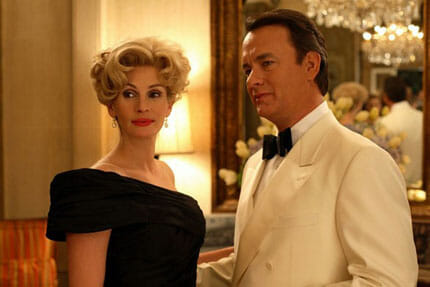
Director: Mike Nichols
Writers: Aaron Sorkin, George Crile (novel)
Cinematographer: Stephen Goldblatt
Starring: Tom Hanks, Julia Roberts, Philip Seymour Hoffman, Amy Adams
Studio/Running Time: Universal, 97 mins.
Time to damn a major motion picture with a single word of faint praise. Charlie Wilson’s War is…cute. That’s it. Two months ago, Oscar pundits supposed that Charlie Wilson, scripted by Aaron Sorkin from the novel by George Crile and directed by Mike Nichols, would be among the year’s best. Now, cut down to a paltry 97 minutes, the film feels neutered, a bit like an innocent puppy. This stripping has resulted in a movie that is insignificant and not even particularly meaningful.
Which isn’t to say this movie fails to entertain. Tom Hanks puts on his best Texas drawl to inhabit a Congressman more famous for attending Vegas parties than meaningful legislative sessions. Representing a congressional district with the fewest needs in the nation, the titular Wilson trades votes for IOUs. The film picks up as the representative is asked to use his stockpiled favors to enhance the CIA’s covert efforts to crush Russia’s intervention in Afghanistan.
Watching Wilson go to war is one hell of a good time. Through sex, drunkenness and innuendo, the decadence of early ’80s politicking certainly comes through. Hanks, perennially reliable, projects an evolving morality that starts out slippery, but becomes almost upright.
Wilson limps clumsily through a meeting with the leaders of Pakistan, beds Joanne Herring (Julia Roberts, portraying a prime mover in the covert war, not to mention the sixth richest woman in Texas) and has great fun with an army of gorgeous secretaries. Meanwhile, a cocaine scandal, which takes place largely in the background, is the biggest hint at the Congressman’s seedy side.
Nichols’ not-so-secret weapon, which he deploys with little caution, is Philip Seymour Hoffman, who plays rough-around-the-edges CIA bureaucrat Gust Avrakotos. The scene between Hanks and Hoffman’s characters introducing the coke scandal is pure, perfectly timed comedy. Hoffman can eke a laugh out of nearly anything, and his delivery makes the most of Sorkin’s dialogue. But he also makes one wonder about Nichols’ comfort level with the material, as Gust’s dialogue camouflages many of the film’s strongest political comments.
Sorely missing from the film’s war is a sense of import. We’re meant to mine rich parallels between the movie’s Middle East and its modern-day counterpart, and the potential for cutting satire is certainly rich. Far more difficult to ignore, however, is the realization that Nichols is pulling punches. His would-be knockout is a limp and obvious dig at current efforts to rebuild Iraq, leaving this particular War feeling more like a minor squabble.